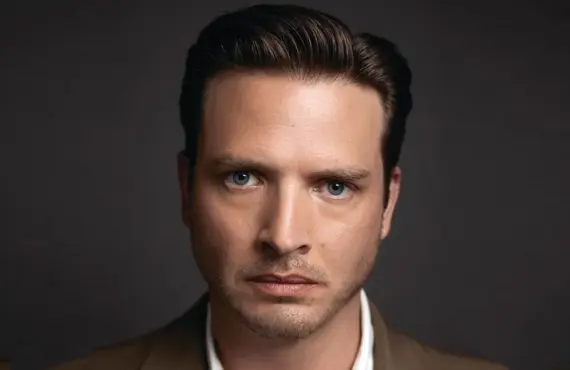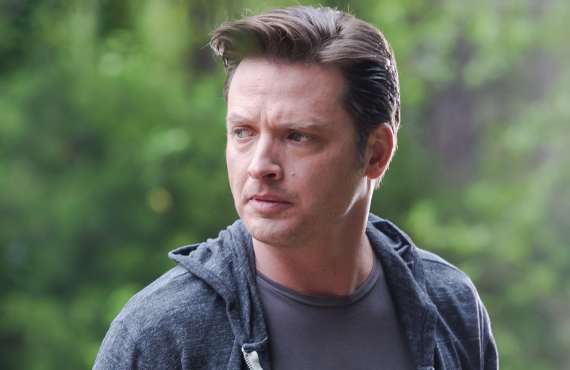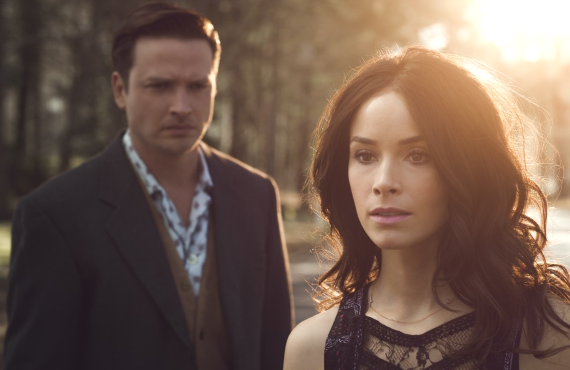The Power of Rectify Was In What It Didn’t Say
-
 Aden Young stars in Rectify (Sundance TV)
Aden Young stars in Rectify (Sundance TV)Rectify (Season 1)
Watch on NetflixIn the 1970s, before “three strikes” laws and publicly traded prison corporations, the United States locked up about one in 1,000 citizens. That rate has since quintupled, making this land the home to fully one-quarter of all inmates in the world.
You can’t say television has been an innocent bystander. As society was filling jail cells, station managers and network executives were filling their schedules with crime coverage and law-and-order programming. Indeed, mayhem and justice have been a profit center since the dawn of mass media. A survey of top-rated broadcast and cable shows over the years (and more recently, streaming and podcasts) offers ample evidence that the media are only giving the people what they want.
Who am I to point out that violent crime levels today are half what they were 20 years ago, or that since 2014 more Americans have killed themselves than killed others? If entertainment was proportionate to the threat, instead of murder thrillers we’d be watching a lot more shows about foreign hackers and identity theft.
But maybe George Findlay, the jaded news director in the ’90s satire More Tears, had it right when he said the job of TV was to tell the same seven stories over and over.
Then in 2013 came Rectify, the Sundance Channel’s first in-house scripted drama. Among other things, Rectify was superb character drama, the zenith of “slow TV,” and, in its quiet way, a challenge to the media’s presumption that violent crime is a license to print money.
Above all, Rectify asked viewers to look at crime and punishment a whole different way, through the eyes of those chewed up and spit out by the criminal justice system.
And it succeeded so well, in large part, because of a sublime performance by Aden Young as Daniel Holden, a man released from prison after 19 years on death row. There’s no shortage of good writing or acting on Rectify, but when you tell an actor he’s not going to have a lot of lines … that the show will turn on his ability to convert the silence into feeling that speaks more emphatically than words … and then he delivers, well, now you’re in rare air.

Rectify won over a lot of television critics, if not viewers, during its first season on Sundance and took home a Peabody Award afterward. The network greenlighted a second season, and then two more, so that creator Ray McKinnon and his team could tell their story in full. Still, the show was a hard sell for some viewers. As critics pointed out at the time, Rectify had about as slow a tempo as any program in memory. By comparison Mad Men was mad paced.
But McKinnon was digging deep, and viewers willing to be patient were richly rewarded. In an interview he said that Rectify was inspired by real-life accounts of men on death row who were later found to be innocent. Despite advances in DNA evidence, there are still an estimated 100,000+ wrongfully convicted persons in prison. Prosecutors are reluctant to admit error. Victims’ families, and the communities that supported them through the trial, don’t want to believe their suffering was in vain.
These are themes Rectify will explore in season 1, but as McKinnon said, “The core of the story is a man’s search for meaning.”
In his book Man’s Search for Meaning, Victor Frankl observed that people who had survived the Nazi death camps had one thing in common — they never surrendered “the last of human freedoms … to choose one’s own way.” Even with a death sentence hanging over them, people can choose life. As Rectify shows us through flashbacks, Daniel Holden matured into manhood in a tiny alabaster cell, using meditation and self-discipline to wall himself off from the horrors around him and find solace within.
But when a judge throws out the case against him and Daniel is released to a world he hasn’t seen in 19 years, he has to start all over again.
Back in his Georgia hometown, Daniel’s father and emotional rock is dead; the man that his mother Janet (J. Smith-Cameron) remarried is a poor substitute. His new stepbrother Teddy (Clayne Crawford) thinks he did the deed, despite what the DNA says. Even Daniel’s sister Amantha (Abigail Spencer), his fiercest defender, can’t seem to break through to him.
Except for occasional brilliant soliloquies, Daniel spends much of season 1 of Rectify in a fog. He’s the man in the Nina Simone song who wants to know what it means to be free. No wonder he retreats to his room and rocks out to old mixtapes. At least he can count on his 1990s Walkman.
That is, until the batteries die and Daniel’s mom has to drive him to Walmart, where his awestruck stroll through its aisles wonderfully evokes the supermarket scene in Moscow on the Hudson. As he and Janet leave the store, however, they are confronted by a TV news crew. The reporter has just interviewed the victim’s mother. She is angry at Daniel’s release because she knows he did it. Now TV wants to know: Daniel, what’s your reaction? Do you have anything to say, Daniel?

The news ambush is a wearisome trope, yet Daniel’s simple, original response saves the scene. Still, it is one of many stinging reminders that few in his community are glad to see him back. Over the course of the first season of Rectify, as Daniel acclimates to his new environs, he will feel these micro-aggressions more sharply.
And then suddenly he lashes out at one of his tormentors. It is a bold freewill choice, his first since leaving prison — but in a cruel irony, he uses the same technique that his jailers on death row used on him. It’s all he knows.
If there is a fault with Rectify, it’s that some of the storylines feel like the dues a character drama is forced to pay the network. Throughout this season Daniel is shadowed by Roland Foulkes, the prosecutor who put him on death row, now a local politician. Despite Michael O’Neill’s best efforts, Foulkes is a two-dimensional role and his storyline, involving a dark double life, is all too familiar. Amantha’s relationship with Daniel’s lawyer Jon (Luke Kirby) is supposed to add complexity, but mostly adds screen time for the supporting cast.
No, the two reasons you must watch Season 1 of Rectify are to look through Daniel Holden’s eyes as he struggles to find meaning in this world, and to ponder a world where a million times a day we’re told that monsters like him don’t get second chances.
Aaron Barnhart has written about television since 1994, including 15 years as TV critic for the Kansas City Star.
TOPICS: SundanceTV, Rectify, Aden Young
- Hilarie Burton to host SundanceTV's True Crime Story docuseries
- BBC and SundanceTV renew The Split to end with Season 3
- SundanceTV renews State of the Union: Season 2 will star Brendan Gleeson and Patricia Clarkson
- AMC Networks boss Sarah Barnett dismisses algorithms: She says the key to TV success is finding offbeat ideas from unsung talent